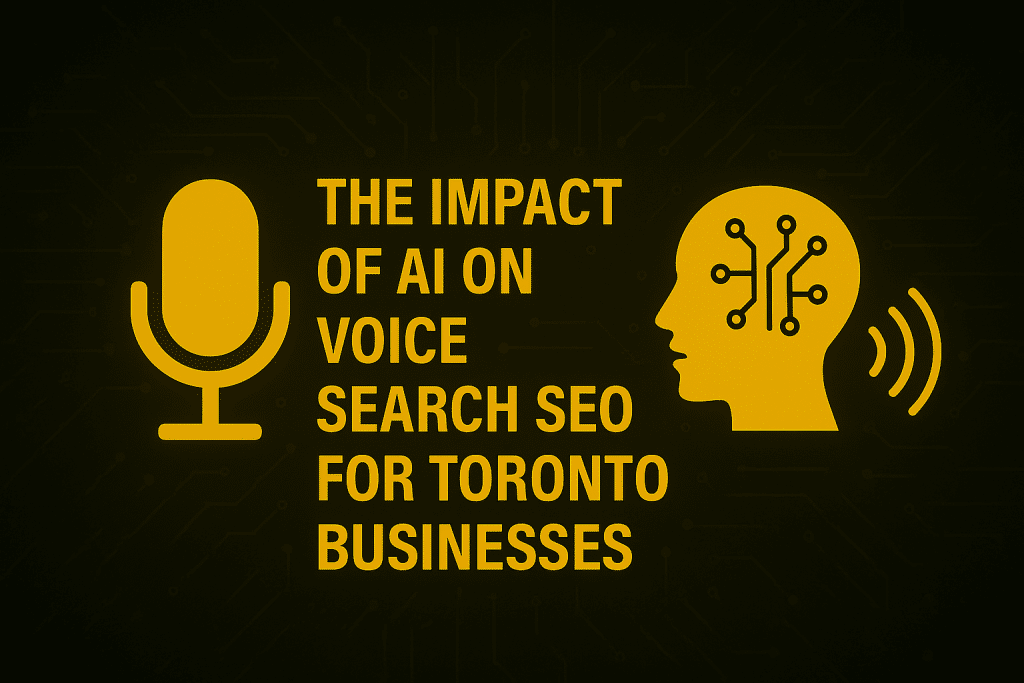Voice search is no longer a futuristic concept; it is an everyday reality. With AI-driven devices such as Google Assistant, Siri, and Alexa, consumers in Toronto are changing how they interact with search engines. For local businesses, this shift creates both challenges and opportunities. Optimizing for voice search SEO powered by artificial intelligence is becoming a necessity for staying visible in an increasingly competitive digital market.
This article explores how AI is transforming voice search, why Toronto businesses must adapt, and the actionable strategies that can future-proof their digital presence.
Why AI Is Reshaping Voice Search SEO
Artificial intelligence is central to the rise of voice search. AI-powered natural language processing (NLP) allows search engines to understand context, intent, and conversational queries. Instead of typing “best coffee shop Toronto,” users might ask, “Where can I get the best latte near me right now?”
For Toronto businesses, this means SEO strategies must evolve beyond traditional keyword targeting to include conversational queries, semantic relevance, and local intent optimization.
AI models now consider multiple signals such as search history, location, and even voice tone. For businesses, this creates a need for more personalized and precise content strategies that directly align with user needs.
Toronto’s Local Market: The Voice Search Advantage
Toronto is one of Canada’s most competitive business hubs. From financial services and real estate to restaurants and retail, businesses compete for prime digital visibility. Voice search is especially critical in this city because:
High smartphone penetration: Almost every consumer carries a mobile device with built-in voice assistants.
Diverse demographics: Multilingual and multicultural communities rely heavily on voice commands for convenience.
Local-first behavior: Queries like “SEO services near me” or “Toronto restaurants open now” are growing in volume each year.
According to industry studies, more than 50% of voice searches are local. This makes voice search SEO in Toronto a high-value strategy for businesses that want to attract ready-to-buy customers.
Conversational Keywords and Long-Tail SEO
Traditional keyword strategies focus on short, exact-match queries. Voice search, however, thrives on long-tail and conversational phrases.
For example:
Typed search: “SEO company Toronto”
Voice search: “Which SEO company in Toronto has the best reviews and affordable packages?”
To rank for these queries, businesses must optimize for natural language content that mirrors human conversation. Adding FAQ-style content on websites is one of the most effective ways to capture these long-tail voice queries.
For deeper insights, businesses can explore articles like Top SEO Agencies in Toronto Using AI to Outrank the Competition to see how industry leaders are leveraging these strategies.
Featured Snippets and Zero-Click Voice Results
Voice assistants often pull answers from featured snippets (position zero) in Google. This means the real competition for Toronto businesses is not just page one rankings but owning the featured answer box.
AI systems select snippets that are:
Concise and direct
Structured with schema markup
Contextually relevant to the query
By targeting question-based queries and implementing structured data, Toronto businesses can increase their chances of being the chosen voice result.
The Role of Local SEO in Voice Search
For businesses in Toronto, local SEO is inseparable from voice search optimization. AI-powered assistants use Google Maps, Google Business Profiles, and citation data to recommend businesses nearby.
Key strategies include:
Maintaining a fully optimized Google Business Profile
Earning positive customer reviews
Adding localized keywords such as “Toronto,” “near me,” and neighborhood names
Ensuring consistent NAP (Name, Address, Phone) details across directories
Resources like Why More Toronto Businesses Are Turning to Local SEO in 2025 provide deeper insights into local-first strategies for ranking in a voice-driven ecosystem.

AI-Powered Personalization in Voice Search
One of the most transformative aspects of AI is personalization. Voice assistants don’t deliver the same results to everyone. Instead, they factor in:
Location history
Previous search behavior
Device usage
Personal preferences
For Toronto businesses, this means generic SEO is no longer enough. Success depends on creating personalized, intent-based content that addresses specific user needs in real time.
For example, a Toronto restaurant can benefit by publishing AI-optimized content like “best vegan pho near Queen Street Toronto” rather than just targeting “vegan pho Toronto.”
Mobile Optimization and Voice Search Readiness
Voice search is overwhelmingly mobile-driven. To compete effectively, Toronto businesses must ensure their websites are:
Mobile-friendly and responsive
Fast-loading with optimized Core Web Vitals
Secure (HTTPS-enabled)
Structured for easy crawling and indexing
Failing to meet these technical standards can mean losing out on both mobile and voice-driven traffic.
To better understand these technical foundations, businesses can review Web Development Essentials: What Every Business Needs.
AI and Multilingual Voice Search in Toronto
Toronto’s diverse population speaks over 180 languages. AI-driven voice assistants are increasingly capable of handling multilingual queries. Businesses that incorporate multilingual SEO strategies gain a competitive edge in appealing to a broader audience.
For example, optimizing content in English, French, Mandarin, or Punjabi can open new market opportunities within Toronto’s diverse communities.
Challenges Toronto Businesses Face in Voice SEO
Despite the opportunities, businesses encounter several challenges when adapting to AI-driven voice search:
High competition in metropolitan markets
Complex algorithm updates powered by AI and machine learning
Constantly evolving consumer behavior
Difficulty in tracking and reporting voice search performance
However, businesses that adopt a proactive SEO strategy with AI integration will gain sustainable long-term advantages.
Best Practices for AI-Optimized Voice Search SEO
Toronto businesses can future-proof their strategies by implementing these proven practices:
Target Conversational Queries: Create content in natural, human-like language.
Optimize for Local Intent: Use Toronto-specific neighborhoods, landmarks, and services.
Build Content Around FAQs: Anticipate customer questions and provide structured answers.
Invest in Schema Markup: Help AI assistants better interpret and deliver your content.
Focus on Reputation Management: Positive reviews improve local visibility.
Measure and Adapt: Use analytics to track performance and continuously optimize.
Agencies that understand these dynamics are already leading the way. Case studies like How a Toronto Business Tripled Organic Leads in Just 90 Days demonstrate what’s possible with the right strategy.
Future Outlook: AI and Voice Search in Toronto
The evolution of AI will only accelerate the adoption of voice search. Future developments include:
Hyper-personalized results based on predictive AI models
Deeper integration with smart devices in homes, cars, and workplaces
Entity-based search results instead of traditional keywords
Voice commerce (“v-commerce”) adoption in retail and services
Toronto businesses that adapt early will be positioned to dominate this new digital frontier.
Conclusion
AI is fundamentally changing how Toronto businesses must approach SEO. With voice search becoming a dominant channel, local companies must evolve beyond traditional SEO practices and embrace AI-powered, conversational, and localized strategies. Businesses that prioritize AI-driven voice SEO today will be tomorrow’s leaders in Toronto’s competitive digital marketplace.
For expert help with implementing AI and voice search SEO strategies, connect directly with the specialists via Contact Toronto SEO.


